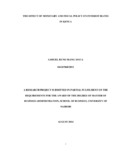The effect of monetary and fiscal policy on interest rates in Kenya
| dc.contributor.author | Mang’ang’a, Samuel Runo | |
| dc.date.accessioned | 2014-12-04T07:22:36Z | |
| dc.date.available | 2014-12-04T07:22:36Z | |
| dc.date.issued | 2014 | |
| dc.identifier.citation | Master of Business Administration | en_US |
| dc.identifier.uri | http://hdl.handle.net/11295/76265 | |
| dc.description.abstract | Implementation of monetary policy and fiscal policy are both functions of the government to influence the economy, usually by varying demand and supply of money through interest rates. The two are done by different agents of the government with monetary policy being implemented by the Central Bank of Kenya (CBK) and the fiscal policy is implemented by the treasury. This study set out to evaluate the effect monetary and fiscal policy have on interest rates and since they are both functions of the existing government. To achieve this, the study made use of secondary data obtained from Central Bank of Kenya and the National Treasury for 40 periods between July 2004 and June 2014 on a quarterly basis. Monetary policy was measured by the Central Bank Rate and the Cash Reserve ratio while monetary policy was measured by the ratio of incremental public debt to the national expenditure for each period. The study found that monetary policy has a higher influence on interest rates than the fiscal policy with the central Bank rate being a significant determinant of interest rates. It is therefore recommended that monetary policy be used to influence rates of interest as opposed to fiscal policy. | en_US |
| dc.language.iso | en | en_US |
| dc.publisher | University of Nairobi | en_US |
| dc.title | The effect of monetary and fiscal policy on interest rates in Kenya | en_US |
| dc.type | Thesis | en_US |
| dc.type.material | en_US | en_US |

